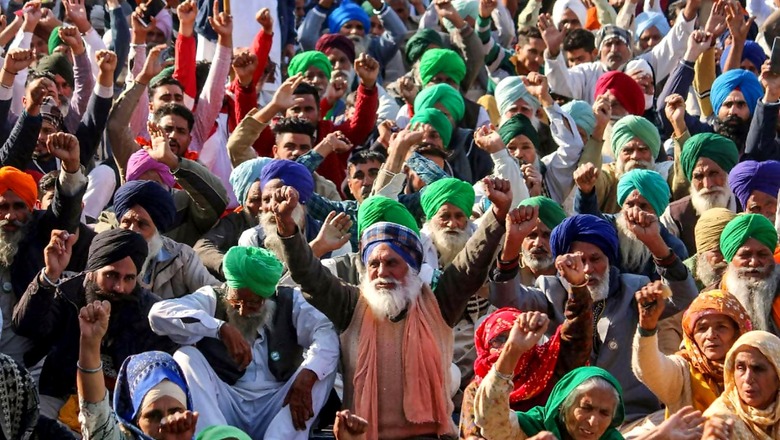
views
Going by many of the discussions around the farmers’ protests, the poster boys of India Inc are the obvious villains. The protests that were crystallised with the Bharat Bandh on September 25, 2020, against the three new central laws on agricultural produce, their sale, hoarding, agricultural marketing and contract farming reforms, have singled out two entrepreneurs: Ambani and Adani.
Politicians in the opposition camp as well as popular discourse on social media believe that the new laws are not just anti-farmer, but have been unleashed to benefit two industrial groups, Reliance and Adani. Whilst, these firms have borne the brunt of the flak coming in against Indian capitalists, they have also directly suffered due to vandalism during these protests. We have seen images of miscreants ransacking a Reliance superstore in Ludhiana, capturing Reliance petrol pumps in the Doaba region and taking control of Adani’s grain storage silos in Moga district. Boycotting of Jio telecommunications has become a new form of protest.
The argument that these bills empower private agri-business units to buy farm produce freely from any farmer and store any amount also paints a picture of the exploitative big versus the vulnerable small. The story extends further to controlling of the small farmers by mighty agri-business corporations, leading to contract farming becoming the dominant mode of agriculture, where what we eat will be decided by profit calculations of capitalists. The added arguments are served in the form of crony comprador capitalists who are able to get large sums as loans from Indian banks only for them to be written off. An RTI response suggests that between 2015 and 2019, Rs 7.95 lakh crore of non-performing loans were written off.
Therefore, quod erat demonstrandum.
To make matters worse, even a layman could intuitively match the exponential rise of Adani Group with the political curve of Narendra Modi to conclude cronyism. But the journey of a college dropout from a trader to the face of a global conglomerate is an incredible story. In 1998, when the group made bets on the Mundra port, in the sweeping badlands of the Kutch region, not many gave it a chance, with the much bigger state-run Kandla port in the vicinity. The development of a large-scale industrial and logistics ecosystem at Mundra is extraordinary entrepreneurialism that is hard to dismiss and nearly impossible to replicate.
Likewise, the meteoric rise of Jio from its launch in September 2016 to a business with 400 million customers and concomitant fall of state-owned BSNL encourages allegations of corporate power arm-twisting public policy. However, Jio is also a story of amazing foresight, technology ambitions, high-speed infrastructure development and building a disruptive internet-based business ecosystem at scale.
So, are big businesses really evil?
Of course, there are Bad Boy Billionaires, just like there are bad boys in every walk of life. But, big businesses are also vehicles, designed to address the needs of society in the most efficient way possible. In doing so, they create employment in much steadier ways than smaller firms. In fact, thousands of smaller firms and start-ups thrive and survive on large business ecosystems. There is reams of research on good employment practises followed by large corporations. Peter Drucker (1952) wrote, “… the business enterprise, especially the large business enterprise, exists for the sake of the contribution which it makes to the welfare of society as a whole. There is, in fact, no disagreement, except on the lunatic fringes of the Right and on the Left.”
The biggest strength of big enterprise is doing things at a scale unmatched by any other form of enterprise – whether it is software like what TCS or Infosys does or petroleum processing at the Reliance Jamnagar plant or revamping of ports and airports by Adani or development of an electric-vehicle ecosystem by Tata and Mahindra group or modernising the Indian retail sector by Reliance Retail.
The question of big becoming bigger haunts us in these pandemic times, where the wealth of the rich has increased during a crisis. But, could it be denied that private corporations have also fostered innovation and entrepreneurship? As far as cronyism is concerned, it is a failure of governance and regulation.
The fact that Narendra Modi came to power at the Centre riding on the Gujarat model of growth widely perceived as pro-business, draws special attention to successful Gujarati businessmen. A slew of “ease of doing business” policies such as land ordinance (2015), aimed at making it easier for business to acquire agricultural land, passing of Insolvency and Bankruptcy Code (2016), allowing lenders to settle loans with defaulting debtors at a hair-cut, a new labour code to replace the archaic labour laws that could make hiring and firing easy for corporations, all make corporate India appear closer to the political dispensation.
While this may not be politically desirable, it is an absolute necessity for India. It needs a vibrant private sector free of bureaucratic clutches to drive economic growth and development. A friction-free economy built on the dynamism and prowess of innovation drives national competitiveness, creates jobs and provides higher income. In the last 30 years of liberalised India, almost everyone cried hoarse about the ill-effects of licence-permit raj. The transition from a public sector that thrives on monopolistic favours granted by the government to a competitive private sector is a continuous cycle of Samudra Manthan, where only a few will survive. That is the law of nature and business. Indeed, the real test of big Indian business is its ability to conquer the world – much like Apple, Samsung, Tesla, Amazon, Huawei and others. But, surely these aren’t as evil as they are made to appear and we need them for sure.
(The author is the founder of The Entrepreneurship School. Views are personal)
Read all the Latest News, Breaking News and Coronavirus News here




















Comments
0 comment